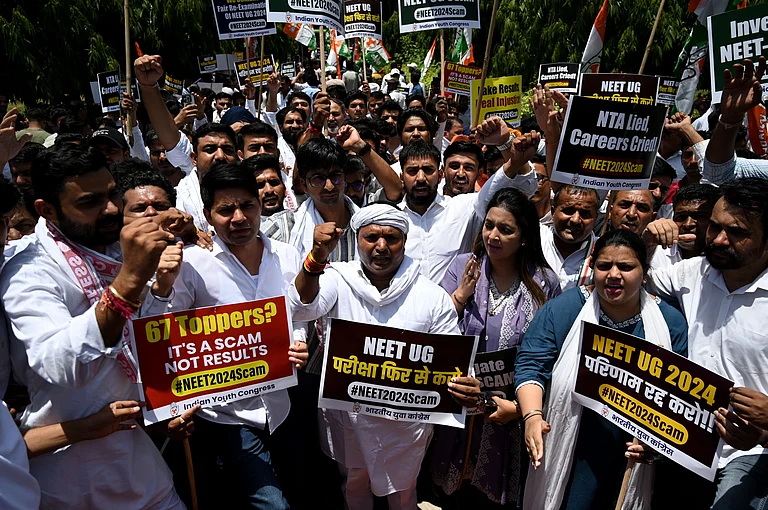The integrity of public examinations in India has long been a subject of concern. With numerous instances of paper leaks tarnishing the credibility of various examinations, there has been a growing demand for stringent measures to curb these malpractices. In response, the Union Government has announced the implementation of the Public Examinations (Prevention of Unfair Means) Act, 2024, starting June 21. This legislation, passed by Parliament on February 9, 2024, and receiving presidential assent on February 12, 2024, had been pending enforcement due to the absence of a formal notification. The timing of this notification is critical, coming amidst a backdrop of significant issues, including the paper leak during the NEET-UG 2024 exam and the cancellation of the recent UGC-NET exam due to similar problems.
The Public Examinations Act: A Comprehensive Solution Or A Band-Aid?
The introduction of the Public Examinations (Prevention of Unfair Means) Act, 2024 comes amidst the backdrop of the paper leak during the NEET-UG 2024 exam and the cancellation of the recent UGC-NET exam
Paper leaks have plagued India’s examination system for years, undermining the fairness and integrity of the selection process. An investigation by the Indian Express revealed that there have been 41 paper leaks in the past five years, affecting approximately 14 million job seekers. These repeated breaches have highlighted the urgent need for robust legislation to tackle this issue. The introduction of the Public Examinations (Prevention of Unfair Means) Act, 2024, represents a landmark step in addressing organised crime networks behind these leaks and holding government bodies, such as the National Testing Agency (NTA), accountable for maintaining examination integrity.
However, despite its critical role, the Act is not without its shortcomings. One significant limitation is that it does not cover state-level exams, leaving it up to individual states to enact their own laws to address these issues. This oversight potentially allows malpractices in state examinations to go unchecked, undermining the uniformity and effectiveness of the fight against examination fraud.
Moreover, the Act contains several other loopholes that could hinder its effectiveness. For instance, it lacks fixed timelines for investigative agencies like the Central Bureau of Investigation (CBI) to probe malpractices, which could lead to delays and inefficiencies. Additionally, the Act does not provide for interim measures during investigations, which means that ongoing exams could still be compromised. Another critical gap is the exemption of students from accountability under this law. Even if a student is found engaging in irregularities, they would not be punished under this legislation, which could potentially encourage such behavior among examinees.
The introduction of this legislation is undoubtedly a significant step forward, but it is not sufficient on its own to combat the pervasive issue of examination malpractices. Strict implementation of the Act is crucial to ensure that its objectives are met. The concerns raised by experts regarding its limitations must also be addressed to make the Act more comprehensive and effective.
The Act’s introduction offers a glimmer of hope for a fairer examination system in India, but it must be part of a broader strategy that includes technological advancements, increased surveillance, and robust administrative procedures. For instance, integrating advanced technology such as blockchain for secure and tamper-proof storage of exam papers and results could significantly reduce the risk of leaks. Additionally, employing AI-driven surveillance during exams could help identify and prevent cheating in real-time.
Furthermore, there needs to be a cultural shift in how exams are perceived. The pressure to succeed in exams often drives students and other stakeholders to resort to unfair means. Promoting a culture of integrity and ethical behavior, starting from school education, can help address the root causes of cheating and malpractices. Educational institutions must emphasise the importance of honesty and the long-term benefits of hard work and fair play.
Collaboration between central and state governments is essential to create a uniform framework that addresses the unique challenges faced by different regions. States must be encouraged and supported to enact similar laws to ensure that the fight against exam malpractices is comprehensive and effective across the country. This collaboration can also facilitate the sharing of best practices and resources, strengthening the overall examination system.
In addition to legal and technological measures, there should be a focus on capacity building among exam-conducting bodies and agencies. Regular training and upskilling of personnel involved in the examination process can help them stay updated with the latest trends and techniques in exam security and management. This proactive approach can enhance the capability of these bodies to prevent and address malpractices effectively.
Moreover, there must be a robust mechanism for monitoring and evaluating the implementation of the Act. Regular audits, feedback from stakeholders, and independent evaluations can help identify gaps and areas for improvement, ensuring that the Act remains effective and relevant over time. This continuous process of assessment and refinement is crucial for maintaining the integrity of public examinations.
In conclusion, the Public Examinations (Prevention of Unfair Means) Act, 2024, marks a significant step towards ensuring the integrity of examinations in India. However, to fully realise its potential, the Act must be implemented strictly and complemented by technological advancements, cultural shifts, and collaborative efforts between central and state governments. Only through a comprehensive and multi-faceted approach can the menace of examination malpractices be effectively tackled, ensuring a fair and credible examination system for all.
The author is a columnist and National General Secretary of J&K students association. He can be reached at umajamal968@gmail.com

